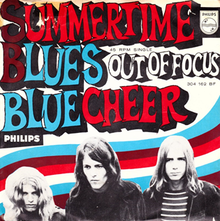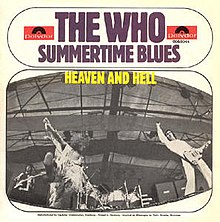
Ray Edward Cochran was an American rock and roll musician. Cochran's songs, such as "Twenty Flight Rock", "Summertime Blues", "C'mon Everybody" and "Somethin' Else", captured teenage frustration and desire in the mid-1950s and early 1960s. He experimented with multitrack recording, distortion techniques, and overdubbing even on his earliest singles. Cochran played the guitar, piano, bass, and drums. His image as a sharply dressed and attractive young man with a rebellious attitude epitomized the stance of the 1950s rocker, and in death he achieved iconic status.
"Last Kiss" is a song released by Wayne Cochran in 1961 on the Gala label. It failed to do well on the charts. Cochran subsequently re-recorded his song for the King label in 1963. It was revived by J. Frank Wilson and the Cavaliers, who took it to number two on the Billboard Hot 100 charts. Wednesday, Pearl Jam, and several international artists also covered the song, with varying degrees of success. The song was one of several teen tragedy songs from that period.

"You Send Me" is a song written and originally recorded by American singer Sam Cooke, released as a single in 1957 by Keen Records. Produced by Bumps Blackwell and arranged and conducted by René Hall. The song, Cooke's debut single, was a massive commercial success, becoming a No. 1 hit on both Billboard's Rhythm & Blues Records chart and the Billboard Hot 100.
"Brand New Cadillac" is a 1959 song by Vince Taylor, and was originally released as a B-side. Featured musicians on the released recording were: Joe Moretti (guitars), Lou Brian (piano), Brian Locking (bass) and Brian Bennett (drums). While not successful in the UK, it got a huge surge in popularity in continental Europe, especially the Nordic countries, with acts such as The Renegades and Hep Stars bringing it to number one in Finland and Sweden respectively. Another Swedish act, the Shamrocks brought the song to number one in France.

"Heartbeat" is a rockabilly song originally recorded by Bob Montgomery and credited to Norman Petty. It was recorded most famously by Buddy Holly in 1958. The B-side of the single was "Well... All Right". "Heartbeat" reached the UK top 10 twice: once in 1975 for Showaddywaddy at number seven and again in 1992 for Nick Berry, recorded as the theme to the television series Heartbeat, which reached number two.
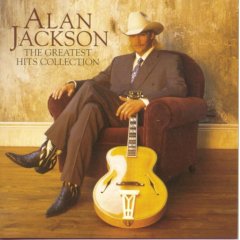
The Greatest Hits Collection is the first compilation album by American country music artist Alan Jackson. Released on October 24, 1995, it includes the greatest hits from his first four studio albums, as well as an album cut from his 1990 debut Here in the Real World and two new tracks — "Tall, Tall Trees" and "I'll Try", both of which were Number One hits for him on the Billboard Hot Country Songs.

Who I Am is the fifth studio album by American country music artist Alan Jackson. The album was released on June 28, 1994, via Arista Records. It features the Number One singles "Summertime Blues", "Gone Country", "Livin' on Love", and "I Don't Even Know Your Name", and the #6-peaking "Song for the Life".
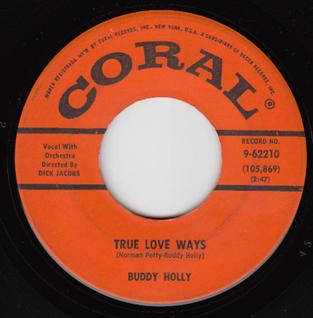
"True Love Ways" is a song attributed to Norman Petty and Buddy Holly. Buddy Holly's original was recorded with the Dick Jacobs Orchestra in October 1958, four months before the singer's death. It was first released on the posthumous album The Buddy Holly Story, Vol. 2, in March 1960. The song was first released as a single in Britain in May 1960, reaching number 25 on the UK Singles Chart. It was released the following month in the US, but did not make the charts. In 1988, a UK re-release of the recording by MCA, the single reached no. 65 on the UK singles chart in a 5 week chart run.

"C'mon Everybody" is a 1958 song by Eddie Cochran and Jerry Capehart, originally released as a B-side.
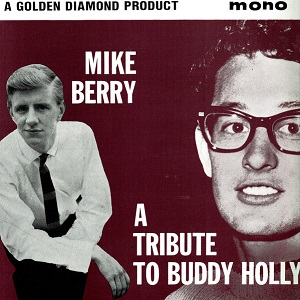
"Tribute to Buddy Holly" is a song written by Geoff Goddard, first recorded by Mike Berry and the Outlaws as a single, which was released in September 1961 on His Master's Voice records. His first chart success, it reached number 24 on the UK Singles Chart in November 1961. The song was banned by the BBC for being too "morbid", regarding the death of 1950s rock and roll singer Buddy Holly, who died in a plane crash on 3 February 1959.

"Everyday" is a song written by Buddy Holly and Norman Petty, recorded by Buddy Holly and the Crickets on May 29, 1957, and released on September 20, 1957, as the B-side of "Peggy Sue". The single went to number three on the Billboard Hot 100 chart in 1957. "Everyday" is ranked number 238 on Rolling Stone magazine's list of the "500 Greatest Songs of All Time".
"Bald Headed Woman" is a traditional blues song, covered by British rock band the Kinks on their eponymous debut album in 1964. Another British rock band, the Who, recorded it in 1964 as the B-side of their first top-ten single "I Can't Explain". The song has also been covered by other artists of the time, including Harry Belafonte, as seen in the Bob Dylan documentary, No Direction Home. It became a number one hit on Kvällstoppen for Swedish rock group Hep Stars in 1965.

"Rock On" is a song written by English singer David Essex. Recorded in 1973 and released as a single by Essex, it became an international hit. In 1989, American actor and singer Michael Damian recorded a cover version that went to number one on the Billboard Hot 100 chart. The song has been recorded many times, including a 2006 version by the English hard rock group Def Leppard.
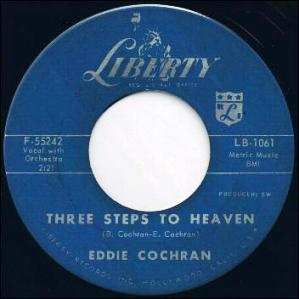
"Three Steps to Heaven" is a song co-written and recorded by Eddie Cochran, released in 1960. The record topped the charts in the Republic of Ireland and the United Kingdom posthumously for Cochran following his death in a car accident in April 1960. In the US it did not reach the Billboard Hot 100.

"Mercury Blues" is a song written by rural blues musician K. C. Douglas and Robert Geddins, and first recorded by Douglas in 1948. The song, originally titled "Mercury Boogie," pays homage to the American automobile marque, which ended production in 2010.
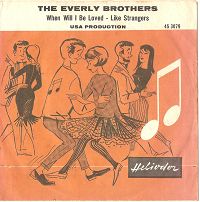
"When Will I Be Loved" is a popular song written by Phil Everly of the Everly Brothers, who had a US top-ten hit with it in 1960. Linda Ronstadt covered the song in 1975, and her version was an even bigger hit in the US, peaking at No. 2. Vince Gill also covered it in 1994 on the soundtrack of the film 8 Seconds.

Alan Jackson is an American country music artist. The first artist signed to Arista Nashville Records, he was with them from 1989 to 2011. He has released 15 studio albums, two Christmas albums, 10 compilations, and a tribute album for the label, as well as 68 singles.
"Farmer John" is a song written by Don "Sugarcane" Harris and Dewey Terry, and first recorded by the two as the American R&B duo Don and Dewey, in 1959. Although the original version of the composition did not receive much attention, it was reinvigorated by the garage rock band the Premiers, whose raving remake of the song was released in 1964. The song's raw and partying atmosphere was immensely popular, reaching number 19 on the Billboard Hot 100. Following the group's national success, several additional interpretations of "Farmer John" were released, making the tune a classic of garage rock.
"So Mystifying" is a song written by English musician Ray Davies, first recorded by his band the Kinks for their 1964 debut album Kinks. It appears as the second track on side one, following "Beautiful Delilah", and is the first track on the album on which Ray Davies performs the lead vocals. The best known version of the song was recorded by Swedish rock group Hep Stars, whose version of the song reached the top-five on both Kvällstoppen and Tio I Topp in 1965.

"Should I" is a song written by Chad Stuart and Jeremy Clyde, first recorded by their duo Chad & Jeremy as the B-side to "I Have Dreamed", which became a top-100 hit in the US. The song was arranged by Stuart and was included a week later on their fourth studio album I Don't Want to Lose You Baby.

